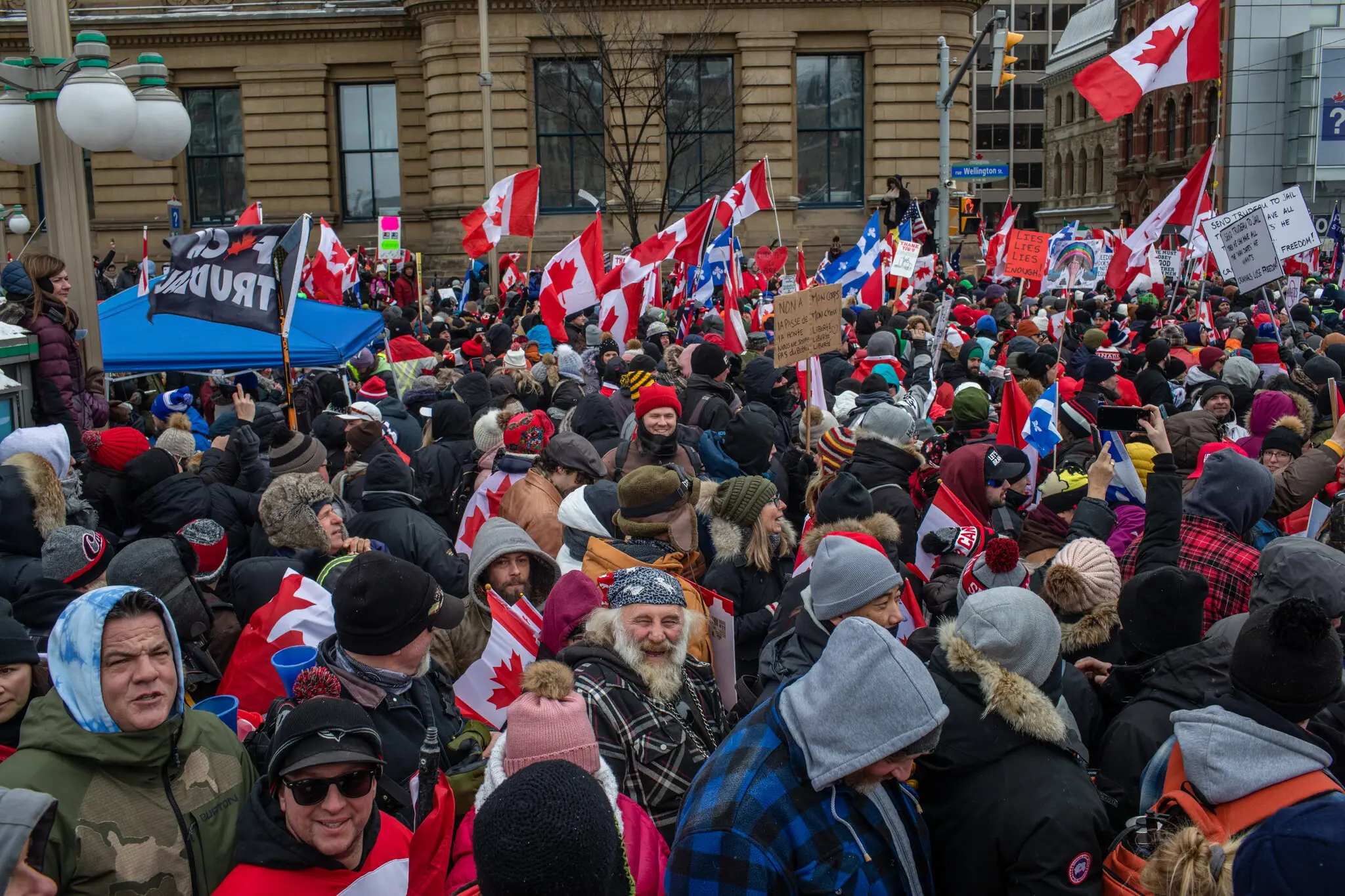Trudeau has faced criticism for invoking Canada’s Emergencies Act, but his move doesn’t necessarily signal democratic erosion.

Chaos erupted in the city of Ottawa, Canada recently as truckers and others protested government COVID-19 restrictions. The Ontario premier had announced that vaccine passports and capacity limits would end March 1, but protesters said that they would not back down until restrictions were completely lifted.
Initially, the protests were small, but have grown organized and efficient, and now represent a wide range of anti-government sentiment. The protesters’ disruption to Canada’s economy was fairly severe: the Detroit Bridge, which carries a quarter of U.S.-Canadian commerce, was blocked for six days.
Finally, on Monday, prime minister Justin Trudeau declared a national public order emergency and invoked Canada’s Emergencies Act for the first time in half a century. This gives Trudeau’s administration the power to ban public assembly in certain locations, seize trucks involved in blockades, and freeze organizers’ bank accounts to prevent them from receiving and using donations. Trudeau has promised he will only use the power temporarily and where it is necessary. He insisted that the order is a “last resort” and not meant to limit peaceful protests.
However, critics argue that Trudeau’s move is a government overstep and a threat to civil liberties. Andreas Park, a professor of finance at the University of Toronto, said that freezing citizens’ accounts amounted to acting “on the basis of suspicions without due process,” and that he expects non-protesters to be caught in the crossfire as bank activities are disrupted. The Canadian Civil Liberties Association said in a statement to TIME that it doesn’t believe the current condition is severe enough for Trudeau to invoke the act, and voiced concern that his move could normalize emergency legislation. And, of course, Conservative Party politicians have also voiced opposition to Trudeau’s actions. Interim Conservative Party leader Candice Bergen called the move “ham-fisted” and said she was “very concerned.”
Although Trudeau faces criticism, I argue that his actions are not inherently anti-democratic. In fact, they actually reflect the strength of Canada’s democracy in one important way: the final decision is not Trudeau’s to make. The emergency order goes to Parliament next, and as a leader of a minority government, Trudeau needs the support of an opposition party in order to pass the act. He is unlikely to take any further action to coerce Parliament into the act’s passage.
In another regime, passing an emergency order that limits the rights of protesters would be one of Varol’s elements of stealth authoritarianism, as it fits the condition of using rule of law rhetoric to deflect attention from anti-democratic action. Without further context, Trudeau’s order could be seen as evidence of the erosion of institutional forbearance, a type of restraint Levitsky and Ziblatt identify as vital to democracy.
However, the absence of other hallmarks of democratic erosion proves that this is just one unusual step taken by a democratic leader, rather than an authoritarian measure. As stated before, institutional checks on Trudeau’s power still exist. He has not made a move toward eliminating those checks or undermining Parliament’s autonomy. This clears him, at least for now, from the elements of constitutional retrogression Huq and Ginsberg warned of.
Furthermore, Levitsky and Ziblatt’s norm of mutual toleration is still strong in Canada. Polarization has not infiltrated its political sphere as deeply as it has in the United States, and political disagreements are mostly civil. Institutional forbearance also remains the default. Trudeau may be taking an unprecedented step, but the goal is not to silence his opposition. I believe him when he says this is a step toward regaining the strong Canadian norm of the rule of law. However, international eyes will be watching to see if Trudeau’s next move defends or threatens Canada’s democracy.

Great piece! I certainly agree that many of Trudeau’s opponents have blown the situation out of proportion (specifically some who have ridiculous and offensive comparisons to Naziism), but unprecedented moves such as his could very well be an early step in the erosion process. Canada definitely benefits from a strong democracy, but a reaction like this to a generally peaceful protest has the potential to escalate tensions, and sets a dangerous precedent for how protests are handled by the government. It will be interesting to see how this issue progresses over the next few weeks!
Kate, I really enjoyed reading your piece! I think the article captures the moment, as dozens of governments have used the pandemic to justify anti-democratic measures, leaving us to wonder whether coronavirus has opened the floodgates to authoritarianism. In times of crisis, all leaders are forced to reckon with the possibility of imposing greater controls on their citizens — and Justin Trudeau is no exception. Levitsky and Ziblatt argue that crises sometimes represent the beginning stages of a leaders’ turn towards democratically erosive behavior. I am no expert on Canadian affairs, so I am not sure if the invocation of the Emergency Order was really necessary; however, I, like you, think it is a positive sign when a leader consistently affirms their commitment to democracy through exercising mutual toleration, institutional forbearance, and a respect towards other institutions in checking executive powers. Insofar as this situation appears to be an independent event, it shouldn’t be a signifier of Trudeau’s authoritarian impulses.
Kate, I really enjoyed this post! The situation in Canada presents an issue that most governments have been facing during the pandemic: respecting civil liberties while keeping their citizens safe. Your discussion of counterarguments was interesting and brought up viewpoints from different actors. I also agree with you that Prime Minister Trudeau has not demonstrated signs of an autocrat and that institutional checks will prevent democratic erosion in Canada. Horizontal accountability, the classic notion of checks and balances, is one way to keep leaders accountable. Does the parliamentary system in Canada enforce horizontal accountability more than the presidential system in the United States?